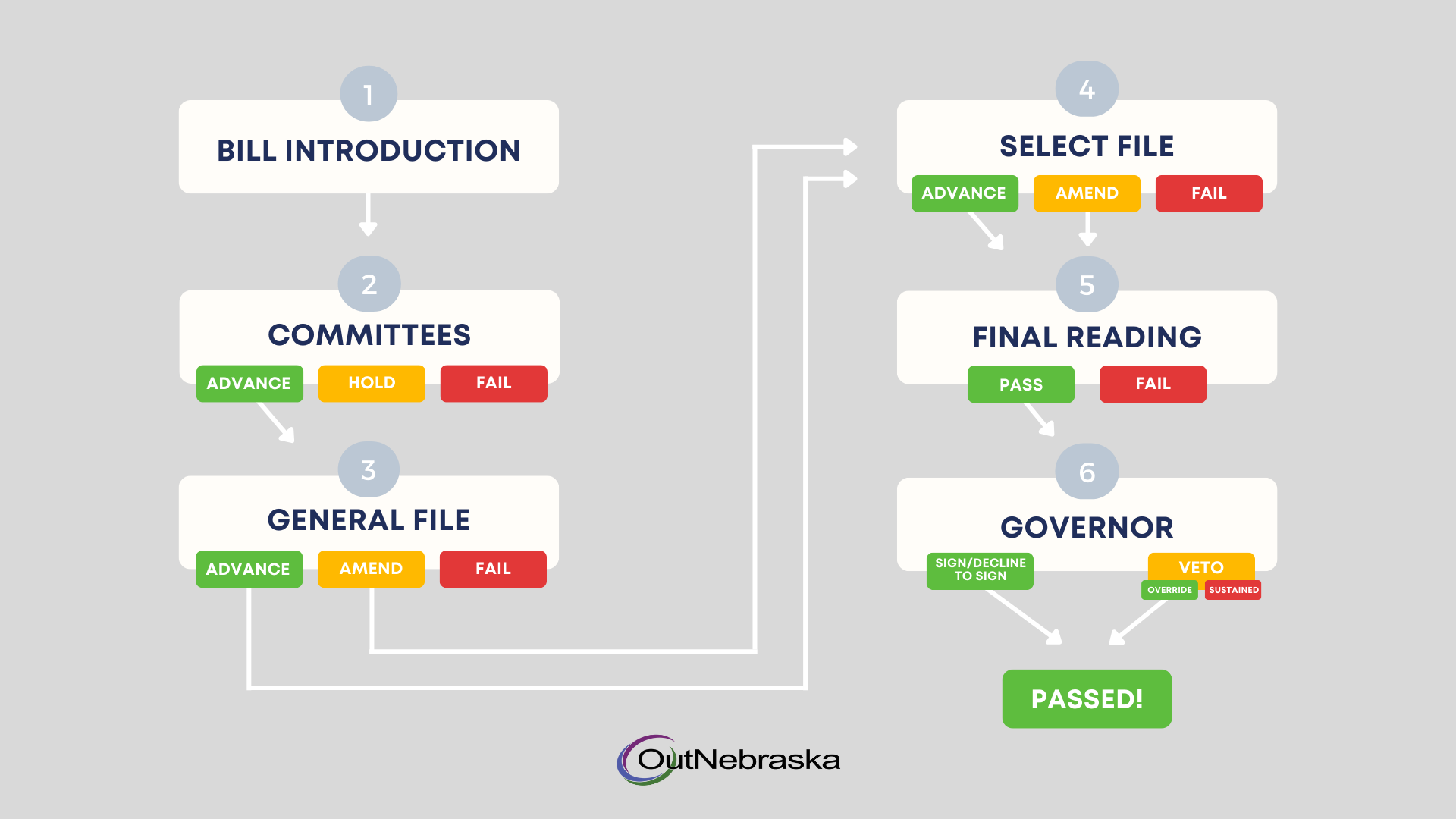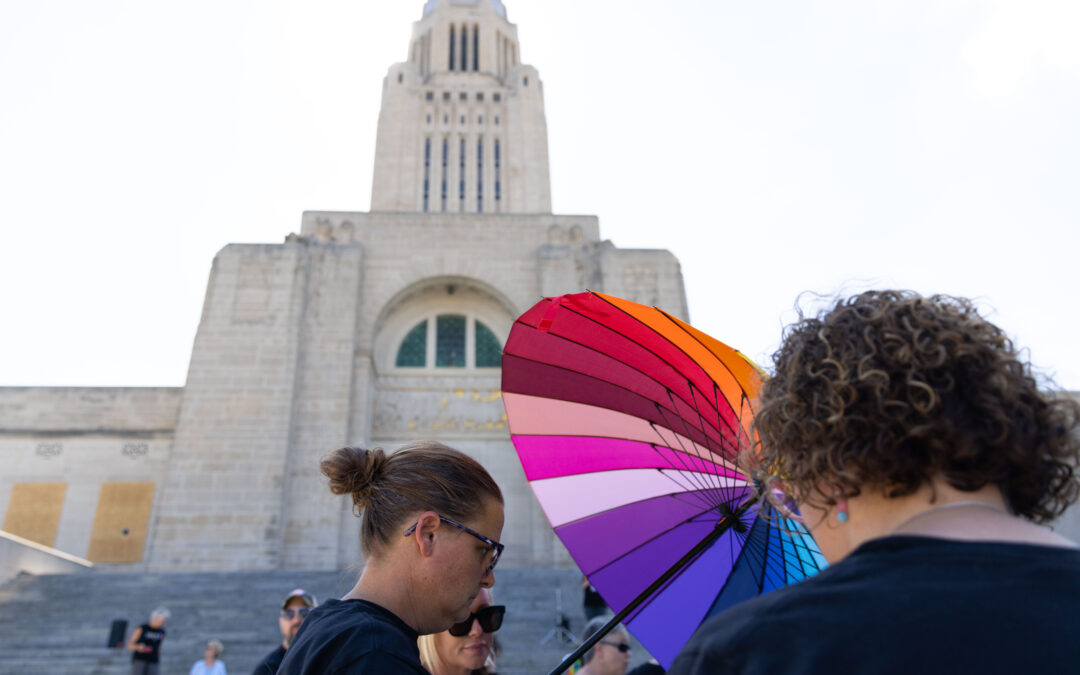Speak Out Nebraska: Join Us January 29th
As part of our coverage, we’re hosting Speak Out Nebraska, our virtual event series to gather and discuss the 2025 legislative session. The agenda includes topics such as how the legislature works, bills we’re tracking, and how to contact your representatives. Our first presentation for 2025 will be Wednesday, January 29—we hope to see you there!
Legislature 101
Nebraska is the only state in the nation with a unicameral legislature, meaning there is only one legislative body making decisions. Other state legislatures are separated into two houses, usually referred to as the Senate and upper house. Our unicameral is also nonpartisan, meaning that it does not officially recognize party affiliations amongst its members.
Here are some key facts to know about the legislative process:
Public hearings will begin on January 22. Every bill will get assigned to a committee, and a public hearing is scheduled at least a week in advance. After each hearing, committees may vote to make amendments and to advance the bill.
Bills that are advanced out of committee are considered by “the floor” which is just a fancy way to say “all the senators.” There are three rounds of floor debate: General File, Select File and Final Reading. In each round, senators debate, propose amendments and vote whether or not to advance the bill to the next round. Bills need a simple majority (25 votes) to advance each round.
After a bill passes the last round of debate (Final Reading), the bill is sent to the governor to sign. The governor may choose to veto a bill, which is a way the executive branch can stop legislation. If a bill is vetoed, the legislature can override the veto with 30 votes and the bill becomes law.
The governor can also opt to not sign, but also not veto a bill, in which case the bill will still become law after the legislative session ends. However, the governor’s signature is a way to show more approval and to speed up implementation of a law.
There are many times throughout the process where a bill can be defeated. If it doesn’t get enough votes to pass to the next round or overcome a veto, it is defeated. If a bill cannot overcome a filibuster, it is defeated.
Some bills don’t make enough progress to get to the governor. Any bill not passed or officially defeated at the end of our two year legislative cycle is marked as “indefinitely postponed.” This means the bill must be re-introduced next session, where it will have to restart the legislative process.

Making Your Voice Heard
- Introduce yourself and your connection to the bill at hand
- State your ask and why it matters to you
- Thank your representative for their time
A more in-depth guide with an example can be found here.
Contact your senator ☎️
The easiest way to make your voice heard is to call, email or send a letter to your representative. Your perspective and concerns are unique and valuable. Senators need to hear from you to know what will help and harm our communities. Click here to find your senator.
Testify at a public hearing 📣
The most impactful way to make your voice heard is through in-person testimony at public hearings. Sharing your story is a powerful way to connect legislation to the real people of Nebraska.
For most hearings, you will have 2-3 minutes to speak. This is about 1 page single-spaced, or 500 words. Your testimony should have your name (you will need to spell it for the record) and whether you support, oppose, or are neutral on the bill.
We recommend you come with your statement written down or printed out. Bring at least one extra copy of your statement (the legislature recommends 15 copies if you’re able) so it can be shared with committee members.
On hearing days, bill supporters (proponents) will testify first, followed by opponents, and those testifying in a neutral capacity go last. If you have questions about testifying, send us a message!
Submit written comment online ✍️
You can submit comments on a bill as soon as a public hearing is scheduled. All comments must be submitted before 8:00am Central Standard Time the day of the hearing.
Online comments are simple. Just fill out your information and leave a statement about why you support/oppose/are neutral on the bill.
How to Submit Online Comment
2. Find the bill you would like to comment on. You can either search for the bill on the right-hand side search bar OR navigate to the ‘search bills’ page on the left-hand side.
3. Read through the notification on written comments and click ‘I Understand.’
4. Click ‘Yes’ on the Include Comment in Hearing Record question if you want your comment to be officially recorded in the public record.
5. Fill out your personal information and your email will be used to confirm your comment submission and in case a senator would like to get in touch with you.
6. Write your written comment in the box. Note: You have a 500 word limit.
7. Complete the reCAPTCHA prompt and then click the ‘Submit Comment’ button at the bottom of the page.

